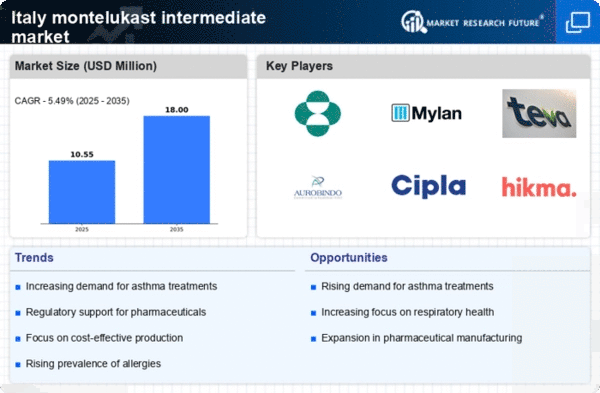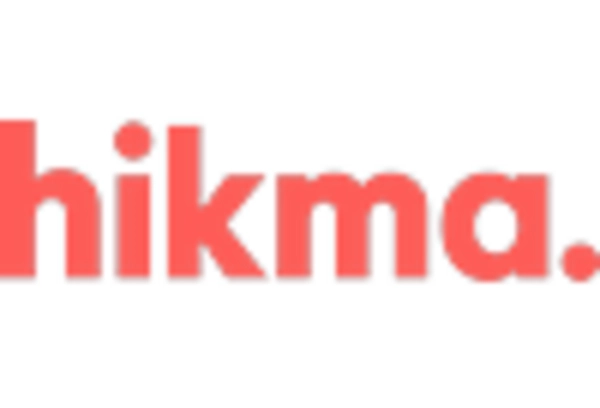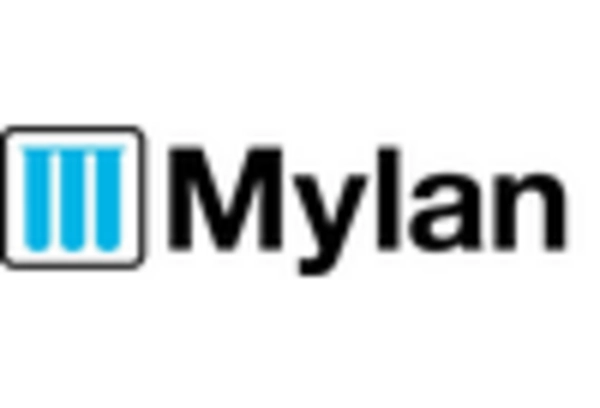Regulatory Framework Enhancements
The regulatory framework governing the pharmaceutical industry in Italy is evolving, which may positively influence the montelukast intermediate market. Recent reforms aimed at streamlining the approval process for new drugs and intermediates are likely to facilitate quicker market entry for montelukast products. This regulatory support can encourage manufacturers to invest in the production of montelukast intermediates, knowing that they can navigate the approval process more efficiently. Additionally, compliance with stringent quality standards may enhance the reputation of the montelukast intermediate market, attracting more stakeholders. As regulations become more favorable, the potential for growth in this market appears promising.
Growing Awareness of Preventive Healthcare
There is a notable shift towards preventive healthcare in Italy, which is influencing the montelukast intermediate market. As healthcare providers and patients increasingly recognize the importance of early intervention in managing respiratory conditions, the demand for montelukast as a preventive treatment is likely to rise. This trend is supported by public health campaigns aimed at educating the population about asthma management and allergy prevention. Consequently, the montelukast intermediate market may experience heightened demand for intermediates used in the production of preventive therapies. The emphasis on preventive healthcare aligns with broader healthcare goals in Italy, suggesting a sustained interest in montelukast-based solutions.
Advancements in Pharmaceutical Manufacturing
Technological advancements in pharmaceutical manufacturing processes are significantly impacting the montelukast intermediate market in Italy. Innovations such as continuous manufacturing and process optimization are enhancing production efficiency and reducing costs. These advancements enable manufacturers to produce montelukast intermediates at a larger scale while maintaining high quality. As a result, the montelukast intermediate market is likely to see increased competition among producers, leading to more affordable pricing for end products. Furthermore, the integration of automation and digital technologies in manufacturing processes may streamline operations, thereby attracting new entrants into the market. This trend suggests a potential for growth in the montelukast intermediate market as companies adapt to these technological changes.
Increasing Prevalence of Allergic Conditions
The montelukast intermediate market in Italy is experiencing growth due to the rising prevalence of allergic conditions such as asthma and allergic rhinitis. Recent studies indicate that approximately 10% of the Italian population suffers from asthma, which has led to a heightened demand for effective treatments. Montelukast, as a leukotriene receptor antagonist, plays a crucial role in managing these conditions. Consequently, the montelukast intermediate market is likely to benefit from this increasing patient population, as healthcare providers seek reliable intermediates for the production of montelukast. The market's expansion is further supported by the growing awareness of the importance of managing allergies, which may drive pharmaceutical companies to invest in the development of montelukast-based therapies.
Rising Investment in Research and Development
Investment in research and development (R&D) within the pharmaceutical sector is a key driver for the montelukast intermediate market in Italy. Pharmaceutical companies are increasingly allocating resources to develop new formulations and delivery methods for montelukast, aiming to enhance its efficacy and patient compliance. This focus on R&D is expected to lead to innovative montelukast-based products, thereby expanding the market. According to recent data, R&D spending in the Italian pharmaceutical industry has increased by approximately 5% annually, indicating a robust commitment to innovation. The montelukast intermediate market stands to gain from these advancements, as new products may require specialized intermediates, further stimulating demand.
















